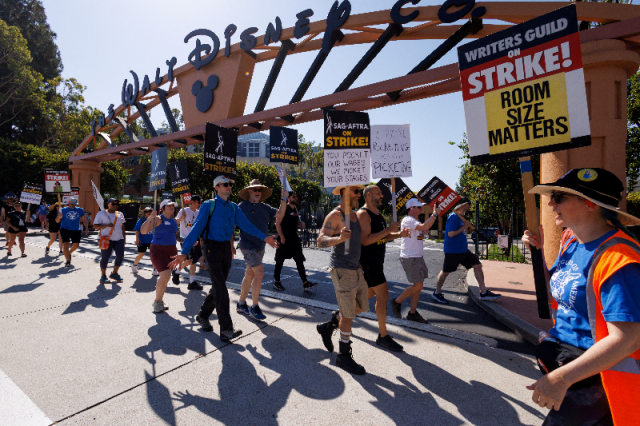
LOS ANGELES — Hollywood’s writers union said it reached a preliminary labor agreement with major studios on Sunday, a deal expected to end one of two strikes that have halted most film and television production and cost the California economy billions.
The three-year contract still must be approved by leadership of the Writers Guild of America (WGA) as well union members, before it can take effect.
The WGA, which represents 11,500 film and television writers, described the deal as “exceptional” with “meaningful gains and protections for writers.”
“This was made possible by the enduring solidarity of WGA members and extraordinary support of our union siblings who joined us on the picket lines for over 146 days,” the negotiating committee said in a statement Sunday.
The WGA settlement, while a milestone, will not return Hollywood to work. The SAG-AFTRA actors’ union remains on strike.
Writers walked off the job on May 2 after negotiations reached an impasse over compensation, minimum staffing of writers’ rooms, the use of artificial intelligence and residuals that reward writers for popular streaming shows, among other issues.
The Alliance of Motion Picture and Television Producers, the trade group representing Walt Disney DIS.N, Netflix NFLX.O, Warner Bros Discovery WBD.O and other major studios, did not immediately respond to a request for comment.
Hollywood’s dual strikes had shut down production of movies and TV series and sent late-night talk shows into re-runs. Efforts to restart daytime talk shows without writers, such as “The Drew Barrymore Show,” collapsed this month, in the face of criticism from striking writers and actors.
At picket lines, protests took on the rhetoric of class warfare. Writers assailed media executives’ compensation and said working conditions had made it hard for them to earn a middle-class living.
Executives at times fanned tensions. Disney Chief Executive Bob Iger, fresh off a contract extension that offered an annual bonus of five times his base salary, criticized striking writers and actors as “just not realistic” in their demands.
Iger subsequently struck a conciliatory note, citing his “deep respect” for creative professionals.
The work stoppages took a toll on camera operators, carpenters, production assistants and other crew members, as well as the caterers, florists, costume suppliers and other small businesses that support film and television production.
The economic cost is expected to total at least $5 billion in California and the other U.S. production hubs of New Mexico, Georgia and New York, according to an estimate from Milken Institute economist Kevin Klowden.
Four top industry executives – Iger, Warner Bros Discovery CEO David Zaslav, Netflix co-CEO Ted Sarandos and NBCUniversal CMCSA.O Studio Group Chair Donna Langley – joined negotiations this week, helping to break the months-long impasse.
As with past writers’ strikes, this job action responds to Hollywood capitalizing on a new form of distribution – and writers seek to participate in the newfound revenue. The 100-day strike in 2007-08 focused, in part, on extending guild protections to “new media,” including movies and TV downloads as well as content delivered via ad-supported internet services.
This time around, a central issue is residual payments for streaming services, which writers said represented a fraction of the compensation they would receive for a broadcast television show. Writers also sought limits on AI’s role in the creative process. Some feared that studio executives would hand a writer an AI-generated script to revise, and pay the writer at a lower rate to rewrite or polish it. Others expressed concerns about intellectual property theft if existing scripts are used to train artificial intelligence.
Reuters reported that Disney has created a task force to study artificial intelligence and how it can be applied across the entertainment conglomerate, signaling its importance.
Even as studio executives celebrated the end of the longest-running writers’ strike since 1988, it is only half the labor battle. The studios must still find a way to get actors back to work.
SAG-AFTRA, representing 160,000 film and television actors, stunt performers, voiceover artists and other media professionals, walked off the job in July, the first time in 63 years that Hollywood faced a strike by two unions at the same time.
At issue are questions of minimum wages for performers, protections against the use of artificial intelligence replacing human performances and compensation that reflects the value actors bring to the streaming services.
– Reporting by Dawn Chmielewski, Lisa Richwine and Danielle Broadway in Los Angeles; Editing by Christopher Cushing









